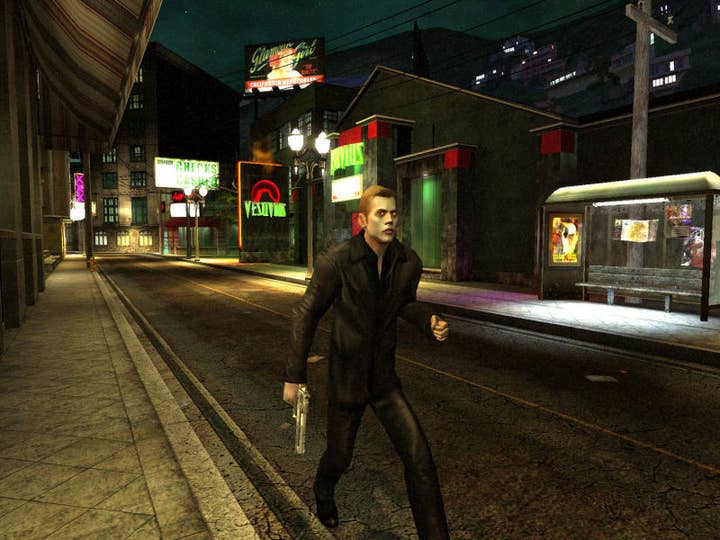The head games of Vampire: The Masquerade - Bloodlines
Why I Love: Jakub Kasztalski explains why Troika Games' undead immersive sim never gets old
Why I Love is a series of guest editorials on GamesIndustry.biz intended to showcase the ways in which game developers appreciate each other's work. This edition was contributed by Jakub Kasztalski, founder and creative director of Unbound Creations, which recently released Headliner: NoviNews, an adventure game about control of the media and its impact on society.
I won't lie - the only reason my 16-year-old self picked up Vampire: The Masquerade - Bloodlines was because of the box. I was rummaging through the gaming section of Bookmans, a "used everything" store in Tucson, Arizona (quite a novelty to a fresh Polish transplant like me). I don't know what it was really - the tantalizing dark blue, the seductive Jeanette and shadowy figure, the golden embossed logo, the heaviness of the box... Something called out to me. And I didn't even care for vampires.
Vampire: The Masquerade - Bloodlines, like the other Troika games, has often been described as diamond in the rough. Leveraging an under-developed (at the time) Source engine and suffering numerous management issues, the released game was clunky to play, featured game-breaking bugs, and had several clearly unfinished levels. But like other Troika games, it had so much depth, relatable characters, and complex mechanics to build a dedicated fan following and earn a "Very Positive" rating on its modernized Steam version.
None of which are reasons I am writing this article.
For me, Vampire: The Masquerade did something no other game has managed to do. Something that only a truly immersive and interactive medium could ever pull off.
Every Good Story Has Humble Beginnings
When I got home, I installed the game and the obligatory 1.2 patch - something you had to do manually in those days by going to GameSpy.com, downloading the four-part archive on your dial-up, and hoping nothing got corrupted in the process. The game starts with a short quiz that suggests the right vampire clan for you. Knowing absolutely nothing about the Masquerade series, I settled on the sexy and skirt-wearing goth girl and went to town...

While I was pretty fluent in English at the time, it was my second language so I could easily excuse the sometimes awkward dialogue. I figured it was my fault, and if anything, I was learning new vocabulary, right? Then there were the occasional cryptic passages. "Okay, great," I thought. "Even as a vampire I'm a weirdo!"
Things only kept getting stranger. I heard odd whispers every now and then. "Must be some NPCs somewhere," I thought.
I talked to a stop sign. "Heh, an easter egg," I dismissed the occurrence.
Other characters spoke of me in strange terms at times - "They're all probably plotting against me!"
But it didn't matter. I had an infiltration mission to complete, on board the Elizabeth Dane ship no less! To my pure childish joy, many heinous vampiric crimes were committed that night.
In the Mouth of Madness

At that point, I needed a break from prowling the streets of virtual Los Angeles. I returned to the derelict apartment to check emails, talk to the roommate, and idly flipped on the TV.
The newscaster counted off recent events and odd incidents (which the game is no stranger to, as I realized by now). Then, he reported on a series of heinous vampiric crimes committed on board the Elizabeth Dane. I took a double take, but before I could process it, the reporter looked straight at me and said: "The police are investigating, and they know it was you."
"They know it was you."
Epiphany
It all suddenly clicked into place, everything - the odd phrasing, the strange noises, the comments, the things I saw that weren't there. I was schizophrenic. In the game, of course. But not as a simple character trait that modifies dice rolls. No. I was schizophrenic in the very fabric of the game rules and world.
As it turns out, I accidentally picked the Malkavian vampire clan without reading the fine print. They are clinically and prophetically insane, but to me, I was just playing a normal game about vampires. Everything seemed normal, just as the designers (the "gods" of the game) intended.
It wasn't the game telling me I was insane. It wasn't a doctor giving me a diagnosis. No. It was me, slowly, gradually, organically, coming to terms with my own insanity, and doubting everything I'd see and hear. It gave me a glimpse into a whole different reality and way of being. The experience was nothing like the typical escapism or power-fantasy I've experienced in other games.
How it Influenced Me
In real life, I struggle with depression, anxiety and impostor syndrome (something being an indie dev certainly doesn't help with. Ha!) Luckily, I have never had any psychotic episodes or hallucinations. I don't really know what it's like to be schizophrenic, and I don't mean to make light of the illness. But for a little bit, I think I got a glimpse into it.
A book can tell you what it's like to live a certain way. A movie can show you what it's like to live a certain way. A poem can make you empathize with living a certain way. But a game - a game can actually make you "be" that way, even if for just a little bit.
It's something only an immersive and interactive medium could ever do so well. It's something that I have been trying to replicate in my own games - not specifically with mental illness, but the idea of seducing players into succumbing to their own personal biases, only to shake them into organically re-thinking their viewpoints.
If this article intrigued you enough to check out Vampire: The Masquerade out, make sure you grab the Unofficial Fan Patch. It comes in two flavors, one merely fixing the innumerable bugs, and the other re-balancing and restoring a lot of lost content. If immersive sims are your jam, you won't be disappointed.
Oh, and if you do meet the Stop sign - tell it I said 'Hello.'
